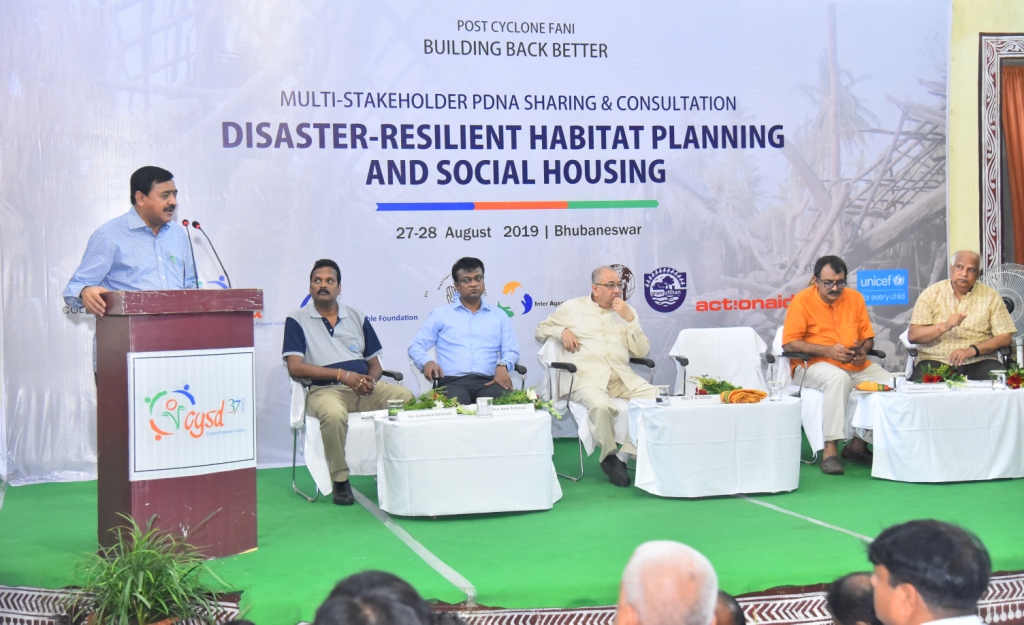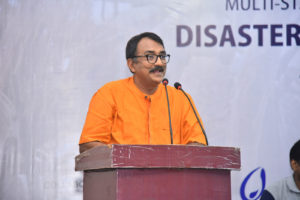Post Cyclone FANI – Rebuilding Odisha “Habitat for Odisha, Forum to Drive the Social Housing Movement”
The present minimalistic housing schemes are not the answer to the long-term needs of the people in disaster-prone areas. Therefore, the policy gear has to radically shift from minimalistic approach to the disaster resilient housing – using innovative means. Therefore, a Multi-stakeholder Consultation on Post Cyclone FANI – Rebuilding Odisha “Habitat for Odisha, forum to drive the Social Housing Movement” was organized on the 27th & 28th of August.

The Key Objectives of the consultation were to share experiences and expertise on appropriate, low cost and disaster-resilient technologies for construction of houses; to develop mechanism of convergence and dovetailing resources including affordable credit for constructing the houses in a time-bound and appropriate manner; and to develop a framework of actions to bring about appropriate policy and guidelines for construction of disaster-resilient houses in disaster-prone areas.
The deliberation of the Consultation was held in three separate Thematic Groups, like (I) Disaster Resilient Housing, (II) Access to affordable Credit for Social Housing, and (III) Dealing with most Vulnerabilities and Vulnerable population.
The consultation was participated by 165 delegates, like officials from Government Departments of Panchayati Raj and Drinking Water Supply (PR & DW), Housing & Urban (H&UD); Odisha Urban Housing Mission (OUHM), Odisha State Disaster Management Authority (OSDMA), Humanitarian Agencies, Civil Society Organizations, Technical Institutions, Aid Agencies, UN Agencies, Financial Institutions—National Housing Bank, Micro Finance Institution and the Corporate sector.
Recommendations
A shift to ownership driven approach was emphasized in order to make the social housing programme a movement. A multi-stakeholder forum “Habitat for Odisha’, as an initiative to drive the social housing movement in Odisha is the need of the hour, said Shri K. Chakrabarty, Chief General Manager, National Housing Bank, the apex housing finance body set up by the GoI.
A holistic housing programme with all necessary facilities exploring opportunities from all possible sources including toilet under Swachh Bharat Mission, electricity under Saubhagya, drinking water under pipe water supply programmes, and labour component under MGNREGS, is the need for rural Odisha, said Shri Jugal Kishore Mohapatra, former Chief Secretary, Odisha in a keynote address.
Different platforms such as Government, bankers, MFIs and CSOs should join hands with each other. Even, awareness among rural mass is crucial regarding the process and accessibility of housing loan, said Shri P. K.Biswal, Special Secretary and Director, Institutional Finance, Government of Odisha. State Cooperative Banks, MFIs with their presence in the rural areas may be linked with to facilitate affordable housing finance, he added. A scheme without collaterals up to Rs 10 lakh may be introduced for Rural Housing Finance for economic weaker sections in the State.
Setting up a chain of housing support services hub to extend handholding support to common people in accessing information on various housing schemes, accessing loan from Banks, complying documents and technical-knowhow on construction
of houses with involvement of civil society organizations is important to further drive the social housing movement in the State, said Shri Jagadananda, the Co-founder of CYSD. This will be a major capacity Building to build a safe housing movement in the State, he added.
Further, skill training support on a wider scale for construction workers may be linked with the existing skilling programme in order to meet the quality housing service needs. While focusing on reconstruction of disaster-resilient houses, retrofitting and repairing of the houses, with economically viable may also be planned.

“Habitat literacy focusing on disaster resilient housing schemes, technical knowhow need to be disseminated among the people of Odisha, said Padmashree (Dr.) G. Shankar, Architect and Chairman, Habitat Technology Group, Kerala. The workshop was attended by a wide range of delegates from different sectors including civil society, architects, officials from the government, bankers, micro-finance institutions and social housing experts across the country.
